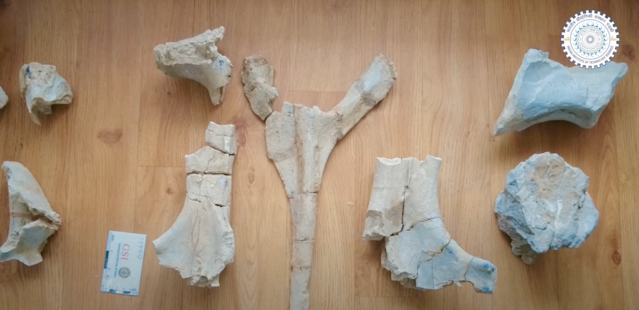Fossils of the oldest plant eating long necked dinosaur that lived on Earth around 167 million years ago were recently unearthed in India, experts say. This shows that the country was an important center for dinosaur evolution.
The discovery reveals some of the earliest giant plant eating reptiles to roam the planet. According to a new study published in the journal Scientific Reports, a dinosaur called “Tharosaurus indicus” walked in India’s Thar desert during the Middle Jurassic period.
The fossil was discovered by researchers from the Indian Institute of Technology (IIT) Roorkee and the Geological Survey of India near the city of Jaisalmer in the western state of Rajasthan – an area that was part of a shoreline along the prehistoric Tethys Ocean.
According to the experts, the new dinosaur was a member of the dicraeosaurids, which had long necks and lived on vegetation. It is also the oldest dinosaur ever discovered in the world and the first of its kind to be discovered in India.
The find offers novel information regarding the variety of sauropod dinosaurs that existed in the prehistoric landmass, which included the Indian subcontinent at the time. “Palaeobiogeographic considerations of Tharosaurus, seen in conjunction with the other Indian Jurassic sauropods, suggest that the new Indian taxon is a relic of a lineage that originated in India and underwent rapid dispersal across the rest of Pangaea.” scientists wrote.
The majority of the Middle Jurassic–Early Cretaceous period dinosaurs from this group have been discovered in Africa and South America, as well as in the US and China.
The bigger group of these dinosaurs, referred to as diplodocoids, had lengthy bodies and necks with spikes on the backs of them, according to researchers. That T indicus also had long depressions on the sides of its neck bones and neural spines, which suggested it probably possessed distinctive spikes that set it apart from other members of its group.
Scientists believe that the diplodocoid dinosaur group may have originated in India and possibly spread from there. In order to find these ancestor dinosaur groups, researchers say the latest discovery highlights the necessity for better survey of older fossil sites in India.
Cover Photo: Bones of the oldest plant eating long necked dinosaur in India. The Independent
